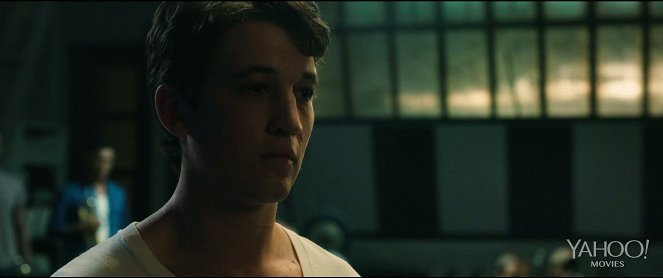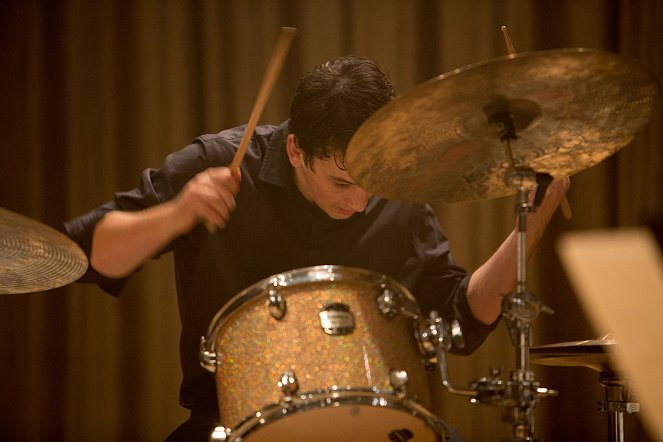Réalisation:
Damien ChazelleScénario:
Damien ChazellePhotographie:
Sharone MeirMusique:
Justin HurwitzActeurs·trices:
Miles Teller, J.K. Simmons, Paul Reiser, Melissa Benoist, Austin Stowell, Nate Lang, Chris Mulkey, Damon Gupton, Max Kasch, Jayson Blair, April Grace (plus)Résumés(1)
Andrew, 19 ans, rêve de devenir l'un des meilleurs batteurs de jazz de sa génération. Mais la concurrence est rude au conservatoire de Manhattan où Il s'entraîne avec acharnement. Il a pour objectif d'intégrer le fleuron des orchestres dirigé par Terence Fletcher, professeur féroce et intraitable. Lorsque celui ci le repère enfin, Andrew se lance, sous sa direction, dans la quête de l'excellence... (Ad Vitam)
(plus)Vidéo (5)
Critiques (15)
Presque aucun autre générique de fin ne m'a fait applaudir aussi vivement que celui-ci. C'est génial ! Même s'il n'y a personne à soutenir ici et que Simmons incarne seulement une créature humaine légèrement moins effrayante que Hopkins dans "Le Silence des agneaux". Un Oscar éventuel pour le son et le montage ne serait pas surprenant, surtout pour une bande sonore n'ayant pas son pareil au monde.
()
Je répète ce que j'ai déjà dit à propos de New York Melody : on n’aura jamais assez de films ayant la musique pour thème, donc le fait que ça existe est une bonne chose en soi. Pour ma part, je ne fais pas totalement partie du public cible, surtout quand l’histoire s’articule autour d’un jeune batteur de jazz et même si la batterie m’a toujours beaucoup attiré. Moi, ce que j’aime avant tout dans les films, c’est la force de l’histoire, le sujet, la qualité du scénario et la richesse de l’intrigue. Je ne suis pas contre un festin visuel et une forme parfaite, mais pour moi, la forme passe toujours après et ça vaut pour tous les domaines de perception. Dans le cas de Whiplash, il est difficile de parler d’une intrigue étoffée. Ça joue de la batterie, ça joue encore, ça s’entraîne durement, ça joue et ça joue encore. Du début à la fin. Même la relation entre les deux protagonistes centraux n’occupe qu’une place secondaire par rapport à la batterie. Néanmoins, je me dois de souligner que Whiplash divertit et, dans la deuxième moitié, il intrigue et impressionne. Milles Teller fournit une belle prestation – à l’instar de J. K. Simmons –, mais j’ai tout de même l’impression qu’il incarne un rôle qu’on ne lui connaît que trop bien. Peut-être est-ce parce qu’il se démène plus que d’ordinaire que les gens le trouvent exceptionnel ? En tout cas, pour moi, il n’arrive pas au niveau d’Ed. Enfin, je retire du film un message sous la forme de la question suivante : une carrière, quelle qu’elle soit, est-elle une raison suffisante pour sacrifier des valeurs fondamentales telles que sont l’amour, l’amitié et la famille ? Et si je devais récompenser ce film d’un Oscar, ce serait pour son montage génial !
()
Spoilers ahead. Without psychologising and unnecessary plot digressions, Chazelle presents a chamber drama with the attributes of a psychological thriller whose rhythm is set by a confrontation between two very strong-willed sociopaths. The development of the narrative is as unpredictable as Fletcher’s teaching methods. As in jazz compositions, a brief release comes after the clashes escalate to the limit of a person’s physical capabilities and is soon followed by another dramatic crescendo. The way that Fletcher appears in a room, his predatory way of returning a gaze and the fact that we never see him in daylight are reminiscent of a monster from a horror movie. Under Fletcher’s influence, Andrew undergoes a transformation from a likable young man with big ambitions into a being that is as equally ruthless and indominable, a first-rate bastard, so to speak. While watching his development, we can ask whether extraordinary success must be preceded by submission and humiliation, the surrender of everything that makes us unique. In the end, Andrew may play without making mistakes, but he also plays without emotion or his own expressive feel. Does such music really represent the ideal self that he wanted to achieve? Chazelle doesn’t assert that it could be any other way in the competitive world of professional music. He doesn’t moralise or excuse the actions of either of the two main characters and, with the cynicism last demonstrated by Scorsese in The Wolf of Wall Street, he allows the two adversaries to devour each other. The film aptly references Rififi, which Andrew and his father go to see at the cinema. Like when committing a heist, there is no room for even a single ill-timed move when playing at the level Andrew desires. All parts of the body must be perfectly synchronized. It is not about the audience, but about the feeling of having full control over oneself and (essentially male) superiority over everyone else who fails to achieve the same level of precision. Like Fletcher and his obsession with tempo, Chazelle prides himself on flawless pacing. The film’s editing corresponds to the frantic drumming. The scenes set in the rehearsal room are precisely rhythmised according to Andrew’s drum hits and Fletcher’s assaults, thus transforming their (mostly) non-contact struggle into a brutal physical battle. The quick cuts between the close-ups of the musical instruments and the shots of body parts also create an effect evoking the merging of the musician with his instrument. Andrew literally lives his music. It characterises him and lends him a voice that can be heard. Therefore we hear it at the beginning before we even see the protagonist for the first time. The frenetic editing combined with the camera penetrating into the most intimate zone of the characters turns Whiplash into a very physical, horror-like experience. In a few places, the frontal assault on the senses has to be subordinated to the plausibility of the plot, into which several coincidences were not very artfully incorporated (the loss of the sheet music after Fletcher warns the musicians to guard it with their lives, the breakdown of the bus after Fletcher emphatically warns everyone to be on time for the concert). Due to the precedence of the visceral experience over probability and psychological motivations, this is not a drama of astonishing complexity, but I thoroughly enjoyed Whiplash as a thriller (on the big screen!). 80%
()
(moins)
(plus)
A manipulative masterpiece. Actually, it has nobody to root for or to relate to – J.K.Simmons is almost a demonic caricature and Teller, with his drive to be the best of the best whatever the price, feels more like an unlikeable mule. But even with that, Whiplash is best enjoyed as an adrenaline ride where you can relish with how Teller hits those drums and Simmons screams and throws chairs at him. And then you don’t even notice those cheap crutches. 75 %
()
The film may push the despot-pupil relationship a little too much, but there’s no better demonstration in recent years that talent alone is not enough; that talent, not nourished by daily grind, immeasurable diligence, focus and a desire for maximalism, regardless of the obstacles, is actually useless. Because as J.K. Simmons says “There are no two words in the English language more harmful than ‘good job’.” Fuck "good job", geniuses must want more. The last time I experienced similar feelings was with the 1961 film The Hustler, with Paul Newman, which says the same thing about talent, though in a completely different industry. The message of this film is more or less clear and it doesn't matter if it is about drummers, violinists, billiard players or tennis players, its insight about Talent is universal.
()



Annonces